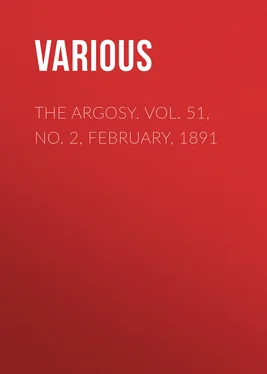Various - The Argosy. Vol. 51, No. 2, February, 1891
Здесь есть возможность читать онлайн «Various - The Argosy. Vol. 51, No. 2, February, 1891» — ознакомительный отрывок электронной книги совершенно бесплатно, а после прочтения отрывка купить полную версию. В некоторых случаях можно слушать аудио, скачать через торрент в формате fb2 и присутствует краткое содержание. Жанр: foreign_antique, periodic, foreign_edu, на английском языке. Описание произведения, (предисловие) а так же отзывы посетителей доступны на портале библиотеки ЛибКат.
- Название:The Argosy. Vol. 51, No. 2, February, 1891
- Автор:
- Жанр:
- Год:неизвестен
- ISBN:нет данных
- Рейтинг книги:5 / 5. Голосов: 1
-
Избранное:Добавить в избранное
- Отзывы:
-
Ваша оценка:
- 100
- 1
- 2
- 3
- 4
- 5
The Argosy. Vol. 51, No. 2, February, 1891: краткое содержание, описание и аннотация
Предлагаем к чтению аннотацию, описание, краткое содержание или предисловие (зависит от того, что написал сам автор книги «The Argosy. Vol. 51, No. 2, February, 1891»). Если вы не нашли необходимую информацию о книге — напишите в комментариях, мы постараемся отыскать её.
The Argosy. Vol. 51, No. 2, February, 1891 — читать онлайн ознакомительный отрывок
Ниже представлен текст книги, разбитый по страницам. Система сохранения места последней прочитанной страницы, позволяет с удобством читать онлайн бесплатно книгу «The Argosy. Vol. 51, No. 2, February, 1891», без необходимости каждый раз заново искать на чём Вы остановились. Поставьте закладку, и сможете в любой момент перейти на страницу, на которой закончили чтение.
Интервал:
Закладка:
I knelt on the prie-dieu , stirring neither hand nor foot; as immovable, in fact, except for my breathing, as a figure cut out of stone. Looking and wondering still, after a time it seemed to me that the lights were growing dimmer, that the room was growing colder; that some baleful presence was beside me with malicious intent to gradually numb and chill the life out of me, to freeze me, body and soul, till the two could no longer hold together; and that when morning came, if ever it did come to that accursed room, my husk would be there indeed, but Janet Hope herself would be gone for ever. A viewless horror stirred my hair, and caused my flesh to creep. The baneful influence that was upon me was deepening in intensity; every minute that passed seemed to render me more powerless to break the spell. Suddenly the clock struck two. At the same moment a light footfall sounded on the stairs outside. It was Sister Agnes coming back to lock the door, and to fetch the key which she had left behind two hours before. I heard her approach the door, and I saw the door itself pulled close to; then the key was turned, the bolt shot into its place, the key was withdrawn, and I was left locked up alone in that terrible room.
But the proximity of another human being sufficed to break the spell under which I had been powerless only a minute before. Better risk discovery, better risk everything, than be left to pass the night where I was. Should that horror settle down upon me again, I felt that I must succumb to it. It would crush the life out of me as infallibly as though I were in the folds of some huge python. Long before morning I should be dead.
I slid from off the prie-dieu , and walking backward, with my eyes glancing warily to right and left, I reached the door and struck it with my fists. "Sister Agnes!" I cried, "Sister Agnes! do not leave me. I am here alone."
Again the curtains rustled, stirred by invisible fingers; again that faint long-drawn sigh ran like an audible shiver through the room. I heard eager fingers busy outside the door; a mist swam up before my eyes, and next moment I fainted dead away in the arms of Sister Agnes.
For three weeks after that time I lay very ill—lay very close to the edge of the grave. But for the ceaseless attentions and tender assiduities of Sister Agnes and Dance I should have slipped out of life and all my troubles. To them I owe it that I am now alive to write these lines. One bright afternoon, as I was approaching convalescence, Sister Agnes and I, sitting alone, got into conversation respecting the room upstairs, and my visit to it.
"But whose coffin is that, Sister Agnes?" I asked. "And why is it left there unburied?"
"It is the coffin of Sir John Chillington, her ladyship's late husband," answered Sister Agnes, very gravely. "He died thirteen years ago. By his will a large portion of the property left to his widow was contingent on his body being kept unburied and above ground for twenty years. Lady Chillington elected to have the body kept in that room which you were so foolish as to visit without permission; and there it will probably remain till the twenty years shall have expired. All these facts are well known to the household; indeed, to the country for miles around; but it was not thought necessary to mention them to a child like you, whose stay in the house would be of limited duration, and to whom such knowledge could be of no possible benefit."
"But why do you visit the room every midnight, Sister Agnes?"
"It is the wish of Lady Chillington that, day and night, twelve candles shall be kept burning round the coffin, and ever since I came to reside at Deepley Walls it has been part of my duty to renew the candles once every twenty-four hours. Midnight is the hour appointed for the performance of that duty."
"Do you not feel afraid to go there alone at such a time?"
"Dear Janet, what is there to be afraid of? The dead have no power to harm us. We shall be as they are in a very little while. They are but travellers who have gone before us into a far country, leaving behind them a few poor relics, and a memory that, if we have loved them, ought to make us look forward with desire to the time when we shall see them again."
Three weeks later I left Deepley Walls. Madame Delclos was in London for a week, and it was arranged that I should return to France with her. Major Strickland took me up to town and saw me safely into her hands. My heart was very sad at leaving all my dear new-found friends, but Sister Agnes had exhorted me to fortitude before I parted from her, and I knew that neither by her, nor the Major, nor George, nor Dance, should I be forgotten. I saw Lady Chillington for a moment before leaving. She gave me two frigid fingers, and said that she hoped I should be a good girl, and attend assiduously to my lessons, for that in after life I should have to depend upon my own industry for a living. I felt at the moment that I would much rather do that than have to depend through life on her ladyship's bounty.
A few tears would come when the moment arrived for me to say farewell to the Major. He tried his best, in his hearty, affectionate way, to cheer me up. I flung my arms round his neck and kissed him tenderly. He turned abruptly, seized his hat, and rushed from the room. Whereupon Madame Delclos, who had been trying to look sympathique , drew herself up, frowned, and pinched one of my ears viciously. Forty-eight hours later I was safely shut up in the Pension Clissot.
Here my personal narrative ends. From this point the story of which the preceding pages form a part will be recorded by another pen. It was deemed advisable by those to whose opinion in such matters I bow without hesitation, that this narrative of certain events in the life of a child—a necessary introduction to the narrative yet to come—should be written by the person whom it most concerned. Now that her task is done, she abnegates at once (and thankfully) the first person singular in favour of the third, and whatever is told of her in the following pages, is told, not by herself, but by that other pen, of which mention is made above.
Between the time when this curtain falls and the next one draws up, there is a lapse of seven years.
CHAPTER VIII
Among other passengers, on a certain fine spring morning, by the 10 a.m. Scotch express, was one who had been so far able to propitiate the guard as to secure a whole compartment to himself. He was enjoying himself in a quiet way—smoking, and skimming his papers, and taking a bird's-eye view now and again at the landscape that was flying past him at the rate of forty miles an hour. Few people who cared to speculate as to his profession would have hesitated to set him down as a military man, even had not the words, "Captain Ducie," painted in white letters on a black portmanteau which protruded half-way from under his seat, rendered any such speculation needless. He must have been three or four-and-forty years old, judging from the lines about his mouth and eyes, but in some other respects he looked considerably younger. He wore neither beard nor whiskers, but his short hair, and his thick, drooping moustache were both jet black, and betrayed as yet, thanks either to Nature or Art, none of those straggling streaks of silver which tell so plainly of the advance of years. He had a clear olive complexion, a large aquiline nose and deep-set eyes, piercing and full of fire, under a grand sweep of eyebrow. In person he was tall and thin; broad-chested, but lean in the flank, with hands and feet that looked almost effeminate, so small were they in comparison with his size. A black frock-coat, tightly buttoned, set off to advantage a figure of which he might still be reasonably proud. The remainder of his costume was in quiet keeping with the first fashion of the period.
Читать дальшеИнтервал:
Закладка:
Похожие книги на «The Argosy. Vol. 51, No. 2, February, 1891»
Представляем Вашему вниманию похожие книги на «The Argosy. Vol. 51, No. 2, February, 1891» списком для выбора. Мы отобрали схожую по названию и смыслу литературу в надежде предоставить читателям больше вариантов отыскать новые, интересные, ещё непрочитанные произведения.
Обсуждение, отзывы о книге «The Argosy. Vol. 51, No. 2, February, 1891» и просто собственные мнения читателей. Оставьте ваши комментарии, напишите, что Вы думаете о произведении, его смысле или главных героях. Укажите что конкретно понравилось, а что нет, и почему Вы так считаете.












